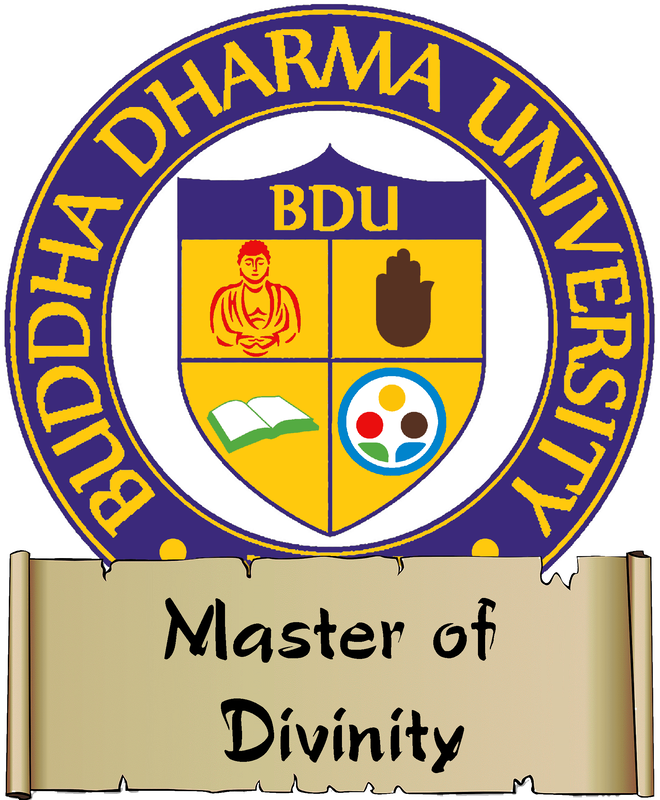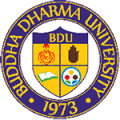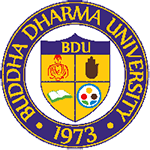MASTER OF DIVINITY

Note: This Degree does not, nor is it intended to mean that the holder is necessarily qualified to apply for the job of a Religious Chaplain.
M.DIV. (MASTER OF DIVINITY)
IN BUDDHIST MINISTRY
40 classes required (25 specified core courses, 15 elective courses), plus a Master’s Thesis
The Master’s of Divinity in Buddhist Ministry is open to those with a college degree (although this requirement can be waived under some circumstances). This degree is usually pursued by those wishing ordination as a Zen Priest (Note: Monks are only accepted on a case-by-case basis with established teachers) or as part of requirements to become a chaplain. Ordination happens at the local Sangha level with affiliated Sanghas, and is not offered through Buddha Dharma University (although many of our teachers are those with whom you may ordain).
The M.Div. goes beyond the Certificate of Buddhist Ministry primarily by requiring the completion and defense of a Master’s Thesis. If we consider the taking of classes a way of gaining breadth in Buddhist knowledge and practices, the thesis provides the opportunity for gaining depth. At the end of the process, you will have become an expert in some area that will be chosen by you (in collaboration with thesis advisors).
Buddha Dharma University focuses on continually forging opportunities to experience a contemporary, in-depth and non-sectarian study of Buddhism, while also promoting the knowledge and understanding of the various traditions, schools and cultures of Buddhism. Programs are therefore taught and mentored by scholars and masters from a variety of traditions, thus taking advantage of America’s unique diversity of Buddhist practice and presentation. Buddha Dharma University provides the opportunity to experience a profound, meaningful and rewarding path to Buddhist scholarship and awakening to your original nature.
One of Buddha Dharma University’s primary functions is to train priests and monks in fundamental Buddhist doctrine, traditional Zen liturgical practice and function, as well as educating priests in a broad spectrum of the essentials of pastoral care from both a priestly and administrative standpoint. As such, we are a Buddhist seminary with special emphasis on Zen training. This course of study aims to help Buddhist Ministers establish a clear direction for their ordained practice and outreach, while developing the knowledge and skill set to be successful in pursuing it. Successful completion of this degree will prepare a Buddhist Minister for service in running his/her own local Buddhist center and/or outreach program.
COURSE REQUIREMENTS and ORDINATION INFORMATION
Some people pursuing the M.Div. may also choose to ordain as a priest or monk at their local sanghas (although this is not necessary to receive the degree). The Buddhist monastic vows within our affiliated Sanghas are intended for only a select very few individuals. They are both rigorous and demanding and they are also ultimately liberating. Because these vows ask much more of the person who is receiving them than do the Brahmajala Priest Precepts, they must be studied and clarified carefully by those who are called to them.
In greater detail, the vows include:
- Vow of simplicity – A vow of restraint, which means monastics are mindful of their actions, consumptions and lifestyle.
- Vow of service – Following the guidance of seniors and teachers, monastics vow to give themselves freely.
- Vow of selflessness – The realization and actualization of one’s life as the life of all beings, rather than a personal entity.
- Vow of stability – This vow requires that monastics have completed major life changes in order to give themselves wholeheartedly to their vows. (this does not preclude stable monogamous relationships, however parenting must be examined closely on a case by case basis).
- Vow to aspire to the Buddha way – To act as a model of the manifestation of the moral and ethical teachings of the Buddha, manifesting wisdom and compassion in all actions.
- Vow to always represent yourself in the manner of a Bodhisattva – This means always wearing Monastic Clothing in all venues of your life, the reason for this is to make yourself available to all who see you while you are out in the public eye. Monks are expected to engage themselves in the world (Monastery Without Walls) 24 hours a day.
Full ordination entails a lifetime commitment to these vows. Monastic candidates need to personally embrace these vows, investigating their internal motivations and possible limitations within the guidelines that the vows provide.
Monks make the ultimate visible commitment to the teacher, the dharma and practices of the Mahasangha. This position signifies that they are a senior elder having fulfilled the additional requirements of passing the Advanced Seminary program for Monastics. Monks have the additional responsibility to perform some of the advance Buddhist ceremonies, and are encouraged to enter the service of the community in an interactive role.
To become a Monk, the applicant must have been actively practicing as a Novice Monk for at least twenty-four months, have graduated from the Seminary Program and have a personal ongoing relationship with a fully-qualified teacher.
The first requirement is that Monks should dedicate all of their extra energy to helping the Zen community by volunteering in every capacity required there; and must have the approval of the Zen center’s Guiding Teacher.

